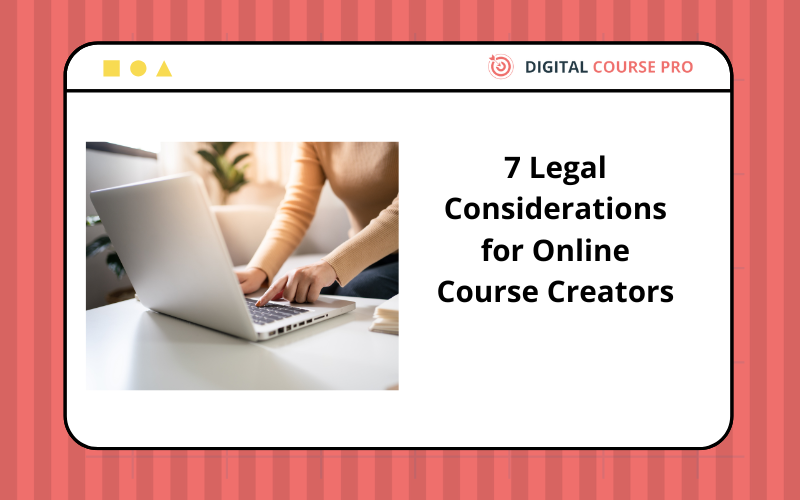Legal considerations for online course creators are essential to understand and address to ensure the success and legitimacy of your e-learning business. As the demand for online education continues to grow, it’s crucial to navigate the legal landscape carefully to protect your intellectual property, comply with regulations, and avoid potential legal pitfalls. Here are seven key legal considerations that every online course creator should be aware of.

1. Intellectual Property Rights
Intellectual property (IP) protection is vital for course creators to safeguard their content from unauthorized use and distribution. Ensure that all your course materials, including videos, slides, and written content, are protected under copyright law. You should also be aware of the IP rights of others to avoid infringing on their work. Utilizing tools like the U.S. Copyright Office or the World Intellectual Property Organization can help you secure and enforce your IP rights.
2. Licensing Agreements
If you incorporate third-party content or resources into your courses, it’s essential to obtain the appropriate licenses. This could include using images, videos, music, or even excerpts from books and articles. Licensing agreements specify how you can use this content and protect you from potential legal issues. Always ensure that you have the proper permissions and that you understand the terms of use for any third-party material.
3. Data Protection and Privacy
Data protection and privacy laws, such as the General Data Protection Regulation (GDPR) in Europe and the California Consumer Privacy Act (CCPA) in the United States, impose strict requirements on how personal data is collected, stored, and used. As a course creator, you must ensure that you are compliant with these regulations to protect your learners’ data. This includes implementing secure data storage solutions, obtaining explicit consent for data collection, and providing clear privacy policies.
4. Terms of Service and Privacy Policy
Having comprehensive Terms of Service (ToS) and Privacy Policy agreements is crucial for any online course platform. The ToS outlines the rules and regulations that learners must agree to when using your course, including payment terms, refund policies, and user conduct. The Privacy Policy, on the other hand, details how you collect, use, and protect users’ personal information. Both documents should be easily accessible on your website and regularly updated to reflect any changes in the law or your business practices.
5. Accessibility Compliance
Ensuring that your courses are accessible to all learners, including those with disabilities, is not only a legal requirement in many jurisdictions but also a best practice for inclusivity. Laws like the Americans with Disabilities Act (ADA) in the U.S. require that online content be accessible to individuals with disabilities. This includes providing captions for videos, using alt text for images, and ensuring that your website is navigable by screen readers. Adopting the Web Content Accessibility Guidelines (WCAG) can help you meet these requirements.
6. Consumer Protection Laws
Consumer protection laws are designed to ensure that consumers are treated fairly and honestly. As an online course creator, you must comply with these laws to avoid deceptive or unfair practices. This includes being transparent about the course content, providing accurate descriptions, and honoring refund policies. Additionally, avoid making false claims about the effectiveness or outcomes of your courses.
7. Tax Obligations
Understanding your tax obligations is critical for the financial health of your e-learning business. This includes collecting and remitting sales tax where applicable and ensuring that you are compliant with local, state, and federal tax laws. Depending on your location and where your learners are based, you may need to navigate complex tax regulations. Consulting with a tax professional who understands the specifics of online businesses can help you stay compliant and avoid penalties.
Conclusion
Legal considerations for online course creators are essential to ensure a smooth and successful e-learning business. Understanding and addressing intellectual property rights, licensing agreements, data protection and privacy, terms of service, accessibility compliance, consumer protection laws, and tax obligations are all critical to protecting your online course and maintaining the trust of your learners. Staying informed about these legal considerations for online course creators can help you avoid potential pitfalls and focus on delivering high-quality educational content.
If you’re ready to elevate your online course business and start earning a substantial income, be sure to explore our detailed guide on How to Make $10,000 a Month with an Online Course Business. This blog post is brimming with actionable strategies, expert insights, and practical tips to help you turn your passion into a reliable source of revenue. Whether you’re just launching your courses or looking to scale up, our guide provides the essential tools and knowledge to help you achieve your financial objectives. Visit our blog today and kickstart your path to earning $10,000 a month!





